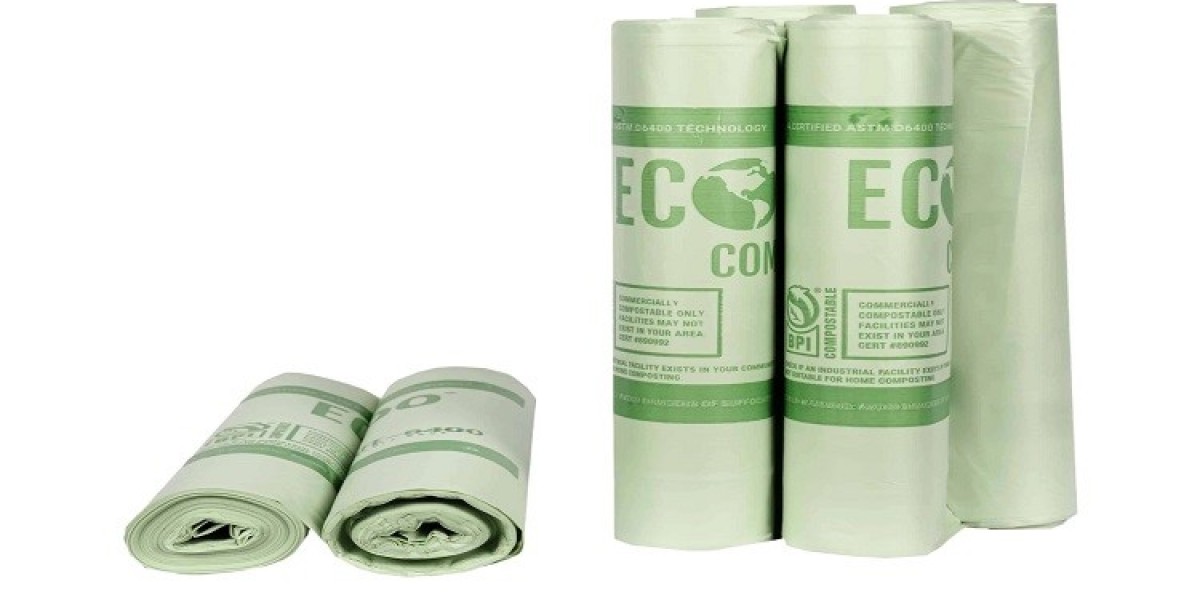Welcome to our blog post on sustainable waste management and the role of biodegradable garbage bags! In today's world, where environmental concerns are at an all-time high, finding eco-friendly solutions for everyday tasks has become crucial. One area that often goes overlooked is waste management. The amount of non-biodegradable waste we generate is staggering, but thankfully, there is a solution: biodegradable garbage bags. In this article, we will explore what these bags are, how they work, their benefits, and the challenges associated with using them. So let's dive in and discover how these little heroes can make a big difference in our fight against pollution!
What are biodegradable garbage bags?
Biodegradable garbage bags are a sustainable alternative to traditional plastic bags used for waste disposal. Unlike regular plastic bags that take hundreds of years to decompose, biodegradable bags are designed to break down naturally in a shorter period, typically within months or years. These bags are made from plant-based materials such as cornstarch or vegetable oils, which makes them compostable.
When these biodegradable garbage bags end up in landfills or composting facilities, they undergo a process called biodegradation. Microorganisms present in the environment break down the bag's chemical structure into simpler organic compounds like water, carbon dioxide, and biomass. This natural breakdown process significantly reduces the impact on our ecosystems and helps minimize pollution.
One key feature of biodegradable garbage bags is their ability to retain strength and durability while being environmentally friendly. They can withstand the weight and volume of typical household waste without tearing easily. Plus, they have similar properties as regular plastic bags when it comes to containment and odor control.
Another important aspect is that these eco-friendly alternatives do not release harmful toxins during decomposition like traditional plastics do. This means that using biodegradable garbage bags contributes less harm to both human health and wildlife habitats.
In addition to their environmental benefits, using biodegradable garbage bags also promotes sustainable practices at home or in businesses. By opting for these green alternatives, individuals can actively participate in reducing their carbon footprint and supporting a circular economy where resources are utilized more efficiently.
Biodegradable garbage bags offer an innovative solution for responsible waste management by combining convenience with sustainability principles. Their ability to degrade naturally without causing long-term harm sets them apart from conventional plastic options – making them an ideal choice for those striving towards a greener future!
How do biodegradable garbage bags work?
Biodegradable garbage bags are a sustainable alternative to traditional plastic bags. But how exactly do they work? Let's dive in!
These innovative bags are made from materials that can break down naturally over time, such as plant-based polymers or compostable plastics. When disposed of properly, biodegradable garbage bags undergo a process known as biodegradation.
During this process, microorganisms like bacteria and fungi break down the bag into smaller pieces through natural enzymatic reactions. These tiny fragments eventually decompose into simpler organic compounds like water, carbon dioxide, and biomass.
The key to the effectiveness of biodegradable garbage bags lies in their ability to degrade under specific conditions. Factors like temperature, humidity, and microbial activity play crucial roles in determining the rate at which these bags break down.
By using these eco-friendly alternatives instead of conventional plastic bags for waste disposal, we can significantly reduce our environmental impact. Biodegradable garbage bags help prevent pollution caused by non-biodegradable plastics that can take hundreds of years to decompose.
Moreover, when these biodegradable bags end up in landfills or composting facilities where proper decomposition conditions exist, they contribute to creating nutrient-rich soil amendments that can be used for gardening or agricultural purposes.
In addition to their positive environmental impact during disposal, biodegradable garbage bags also offer convenience and durability similar to regular plastic trash liners. They are tear-resistant and capable of holding heavy loads without compromising functionality.
However, it is important to note that not all "biodegradable" claims on packaging may hold true. Some products labeled as such may require specific disposal methods or industrial composting facilities for efficient degradation.
To ensure you're making an eco-conscious choice with your garbage bag selection, look for certifications like ASTM D6400 or EN 13432 which guarantee compliance with established standards for compostability and biodegradability.
In conclusion (not concluding), understanding how biodegradable garbage bags work can help us make informed choices that contribute to sustainable waste management. By opting
What are the benefits of using biodegradable garbage bags?
Benefits of Using Biodegradable Garbage Bags
1. Environmental Friendliness: One of the major benefits of using biodegradable garbage bags is their positive impact on the environment. Unlike traditional plastic bags, which can take hundreds of years to decompose, biodegradable bags break down naturally into non-toxic substances within a relatively short period. This helps reduce the amount of waste that ends up in landfills and minimizes harmful effects on ecosystems.
2. Reduction in Plastic Pollution: By choosing biodegradable garbage bags, you contribute to reducing plastic pollution. Traditional plastic bags often end up as litter or marine debris, posing serious threats to wildlife and ecosystems. Biodegradable bags offer a sustainable alternative that breaks down without leaving harmful residues behind.
3. Support for Sustainable Waste Management Practices: Biodegradable garbage bags align with efforts towards sustainable waste management practices. They can be used alongside composting systems or organic waste collection programs since they are designed to degrade under specific conditions such as heat and moisture.
4. Versatility and Durability: Contrary to popular belief, biodegradable garbage bags are not necessarily less durable than traditional plastic ones. Many options on the market today are made from high-quality materials that provide strength and durability while still being able to decompose over time.
5. Consumer Health Benefits: Apart from their positive environmental impact, using biodegradable garbage bags also offers health benefits for consumers themselves. Traditional plastics may contain chemicals such as phthalates or bisphenol A (BPA), which have been linked to various health issues like hormone disruption and cancer risks.
Opting for biodegradable garbage bags provides numerous benefits for both individuals and our planet by promoting eco-friendly waste management practices while reducing pollution levels associated with conventional plastics.
What are the challenges of using biodegradable garbage bags?
Challenges of Using Biodegradable Garbage Bags
While biodegradable garbage bags offer numerous benefits, there are also some challenges associated with their use.
One challenge is the cost. Biodegradable garbage bags tend to be more expensive than traditional plastic bags. This can deter some individuals and businesses from making the switch, especially if they have a tight budget.
Another challenge is availability. Not all stores carry biodegradable garbage bags, so finding them can sometimes be difficult. However, as awareness about environmental sustainability grows, more retailers are starting to stock these eco-friendly alternatives.
Additionally, there may be confusion around how to properly dispose of biodegradable garbage bags. Some people mistakenly believe that they can simply throw them in any trash bin or compost pile without considering specific guidelines for disposal.
Furthermore, while biodegradability is a positive feature of these bags, it also means that they may break down faster than expected if exposed to moisture or heat. This could result in potential leaks or tears during use.
Despite these challenges, the adoption of biodegradable garbage bags remains an important step towards sustainable waste management practices. By addressing these obstacles and promoting education on their proper usage and disposal methods, we can overcome these challenges and make a positive impact on our environment.
Remember: Choosing biodegradable options is just one piece of the puzzle; reducing overall waste production should still remain a top priority for everyone concerned about creating lasting change!
Conclusion
Conclusion
In today's world, where the need for sustainable waste management is more important than ever, biodegradable garbage bags have emerged as a promising solution. These innovative bags not only provide a convenient way to dispose of our waste but also help reduce the environmental impact.
Biodegradable garbage bags are designed to break down naturally over time, thanks to their composition of organic materials that can be easily broken down by microorganisms in the environment. This means that when these bags end up in landfills or composting facilities, they will eventually decompose without leaving behind harmful pollutants or contributing to plastic pollution.
The benefits of using biodegradable garbage bags are numerous. They help reduce the amount of non-biodegradable waste that ends up in landfills and oceans. By choosing these eco-friendly alternatives, we can significantly cut down on our ecological footprint and contribute towards a cleaner and healthier planet.
Biodegradable garbage bags play an essential role in promoting sustainable waste management practices. They encourage individuals and communities to adopt responsible disposal habits while minimizing the negative impacts associated with traditional plastic trash bags.
Furthermore, using biodegradable garbage bags supports the growth of industries focused on producing environmentally friendly products. By creating demand for such items, we incentivize manufacturers to invest in research and development for more sustainable solutions.
However, it is essential to acknowledge that there are challenges associated with using biodegradable garbage bags. One such challenge is ensuring proper disposal methods so that these bags can reach composting facilities instead of ending up in regular landfill sites where they may not degrade as intended.
Additionally, some critics argue that certain types of "biodegradable" plastics may not actually break down completely or within reasonable timeframes under typical environmental conditions. This highlights the importance of selecting reliable brands and understanding their specific certifications or standards for true biodegradability.
Despite these challenges, it is clear that incorporating biodegradable garbage bags into our waste management practices is a step in the right direction. These bags offer an effective








